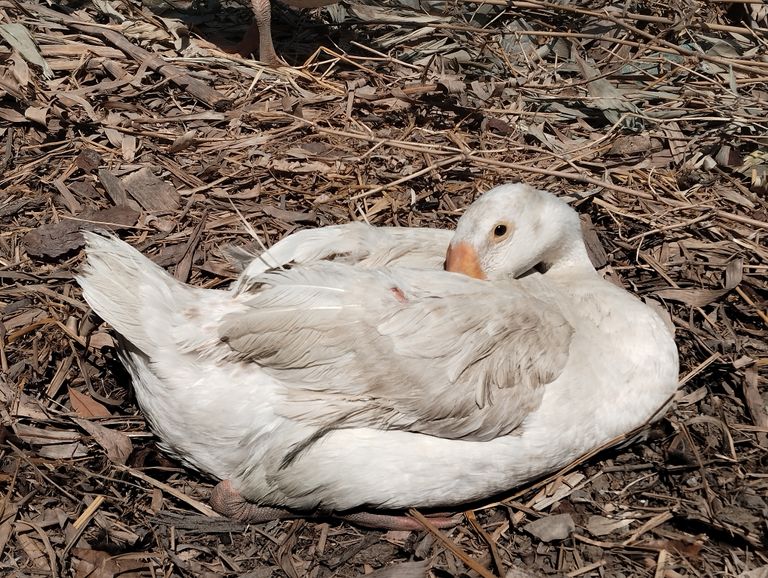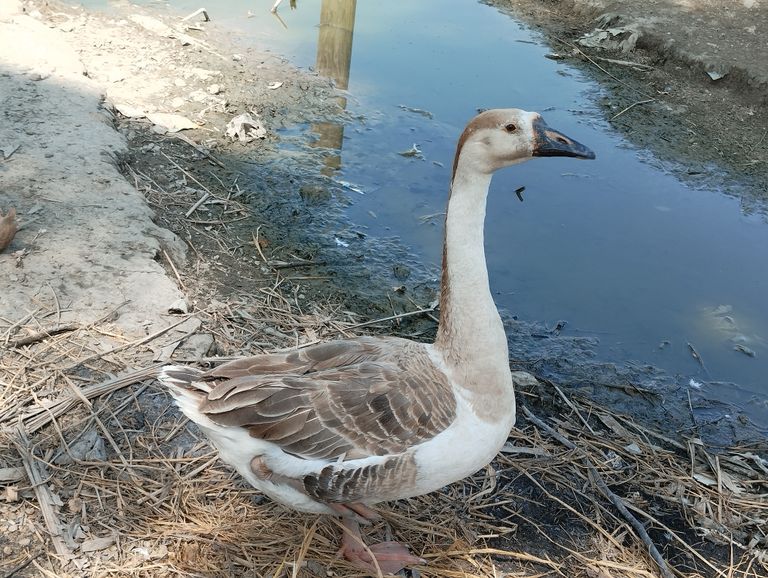
Complete Guide to Raising Geese Methods and Best Practices.
Raising geese, especially domesticated breeds like the Chinese, Toulouse, or Embden, can be a rewarding venture. Geese are not only raised for their meat and eggs but also for pest control, guarding properties, and even as pets. This comprehensive guide will cover everything you need to know about goose farming, from selecting breeds to feeding, housing, health care, and breeding.
- Benefits of Raising Geese
1.1 Meat and Egg Production
Geese are an excellent source of lean meat, rich in flavor and nutrition. Some breeds, like the Toulouse and Embden, are well-known for their meat quality. While geese do not lay eggs as frequently as chickens or ducks, their eggs are large, nutritious, and ideal for baking.
1.2 Natural Weed and Pest Control
Geese are excellent grazers. They eat weeds and control insect populations in farms and gardens, making them valuable for sustainable farming.
1.3 Property Protection
Geese are naturally alert and territorial. They can act as "watchdogs" by honking loudly when they sense intruders.
1.4 Low Maintenance
Compared to chickens or ducks, geese require minimal supplementary feed. They can thrive on grass, reducing the overall cost of feeding.
- Choosing the Right Breed
There are several goose breeds, each with different characteristics:
Embden Goose – A large, white goose primarily raised for meat production.
Toulouse Goose – A French breed known for its high meat yield and foie gras production.
Chinese Goose – A smaller breed that is excellent for egg-laying and guarding properties.
African Goose – A heavy breed known for both meat and guarding purposes.
Pilgrim Goose – A calm, dual-purpose breed suitable for both meat and egg production.
Choose a breed based on your farming goals—meat, eggs, pest control, or companionship.
- Setting Up a Goose Farm
3.1 Housing and Shelter
Geese are hardy birds but require proper shelter for protection against predators and harsh weather.
Space Requirements: Each goose needs at least 10 square feet of space in the shelter.
Bedding: Use straw, hay, or wood shavings to keep the floor dry.
Fencing: Use sturdy fencing (at least 4 feet high) to keep predators out.
Pond or Water Source: Geese love water, so providing a small pond or a tub of clean water is beneficial.
3.2 Feeding and Nutrition
Geese are mainly herbivores and thrive on pasture. However, they need additional nutrients.
Natural Diet (Grazing)
Grass, clover, and other green plants make up 80-90% of their diet.
Allow them to forage freely in a pesticide-free area.
Supplementary Feed
Provide grains like corn, wheat, barley, and oats in limited amounts.
Commercial poultry feed (16% protein) can be given in small quantities.
Fresh vegetables, fruits, and kitchen scraps can be added to their diet.
Water Needs
Always provide clean, fresh water.
Change drinking water twice a day to prevent disease.
- Breeding and Egg Incubation
4.1 Breeding Season
Geese typically breed between February and May.
A good male-to-female ratio is 1 gander (male) per 3-5 geese (female).
Nesting boxes should be lined with straw for comfort.
4.2 Egg Incubation
Natural Incubation: Female geese (hens) often incubate their eggs, which take 28-35 days to hatch.
Artificial Incubation: If using an incubator, keep the temperature at 99.5°F (37.5°C) and humidity at 55-65%.
4.3 Caring for Goslings
Keep newborn goslings in a warm, dry brooder with a temperature of 90°F (32°C) for the first week.
Feed them chick starter feed (non-medicated) for 4-6 weeks.
Gradually introduce them to grass and outdoor conditions.
- Health and Disease Management
Geese are generally hardy, but they can suffer from some common diseases.
5.1 Common Diseases
Aspergillosis: A fungal infection due to damp bedding. Prevention: Keep bedding dry.
Botulism: Caused by contaminated water or spoiled food. Prevention: Clean drinking water regularly.
Parasites (worms, mites, lice): Regularly check and treat with dewormers if needed.
5.2 Vaccination and Prevention
Most backyard flocks do not require vaccines, but large-scale farms may vaccinate for avian flu and Newcastle disease.
Keep the farm area clean and dry to reduce disease risks.
Isolate sick birds to prevent spreading infections.
- Commercial Goose Farming
6.1 Business Plan and Profitability
If you plan to raise geese commercially, consider these factors:
Market Demand: Research the demand for goose meat, eggs, and feathers in your area.
Investment: Initial costs include buying birds, fencing, housing, and feed.
Selling Products: Geese can be sold live, as meat, or for their eggs and feathers.
6.2 Legal Considerations
Check local laws regarding poultry farming.
Get necessary permits if you plan to sell goose meat or eggs commercially.
- Conclusion
Raising geese can be a profitable and enjoyable experience. Whether for meat, eggs, pest control, or as farm guardians, geese are a valuable addition to any farm. By providing them with proper housing, nutrition, and healthcare, you can successfully raise a healthy flock of geese. Would you like more specific guidance on setting up a goose farm? Let me know.


Health Benefits of Eating Goose Meat
Goose meat is a delicacy enjoyed in various cultures worldwide. While it may not be as commonly consumed as chicken or beef, goose meat offers unique nutritional benefits. It is packed with essential nutrients, proteins, and healthy fats, making it a great addition to a balanced diet. In this article, we will explore the health benefits of eating goose meat, its nutritional value, and why you should consider adding it to your meals.
- Rich in High-Quality Protein
Protein is essential for muscle growth, repair, and overall bodily functions. Goose meat provides a significant amount of high-quality protein, which contains all the essential amino acids necessary for maintaining a healthy body. Compared to chicken or duck, goose meat offers a richer and more nutrient-dense protein source.
Benefits of protein in goose meat:
Supports muscle development and strength
Helps in repairing damaged tissues
Boosts metabolism and aids in weight management
Enhances immune system function
- Excellent Source of Healthy Fats
One of the biggest advantages of goose meat is its high content of monounsaturated and polyunsaturated fats. Unlike processed fats, the fats found in goose meat can be beneficial for heart health.
Health benefits of goose fat:
Helps reduce bad cholesterol (LDL) levels
Increases good cholesterol (HDL), promoting heart health
Supports brain function and cognitive health
Provides long-lasting energy
In traditional cuisines, goose fat is often used in cooking due to its rich flavor and health benefits. Many people prefer it as a substitute for butter or other cooking oils.
- High in Essential Vitamins and Minerals
Goose meat is loaded with important vitamins and minerals that contribute to overall well-being. Some of the key nutrients found in goose meat include:
Iron – Supports red blood cell production and prevents anemia
Zinc – Boosts the immune system and aids in wound healing
Selenium – Acts as an antioxidant, protecting cells from damage
B Vitamins (B6 & B12) – Supports brain function, nervous system health, and energy production
These nutrients make goose meat an excellent choice for individuals looking to improve their overall health and vitality.
- Supports Heart Health
Despite being a red meat, goose is relatively healthier compared to processed meats like sausages or bacon. The healthy fats in goose meat, especially omega-3 fatty acids, play a crucial role in reducing inflammation and supporting cardiovascular health.
How goose meat benefits the heart:
Reduces the risk of heart disease
Helps regulate blood pressure
Supports proper circulation and blood vessel health
When consumed in moderation and as part of a balanced diet, goose meat can be a heart-friendly option.
- Boosts Immunity and Fights Inflammation
Goose meat is rich in zinc and selenium, two essential nutrients that help strengthen the immune system. These minerals protect the body from infections, reduce inflammation, and promote faster healing. Additionally, selenium functions as an antioxidant, protecting cells from damage and reducing the risk of chronic diseases.
- Promotes Healthy Skin and Hair
The vitamins and minerals found in goose meat also contribute to healthier skin and hair. The high levels of B vitamins help maintain skin elasticity, reduce signs of aging, and promote hair growth. Meanwhile, the healthy fats in goose meat provide nourishment to the skin, keeping it hydrated and glowing.
- A Great Energy Source
If you are looking for a food that provides long-lasting energy, goose meat is an excellent choice. The combination of protein, healthy fats, and essential nutrients ensures that your body gets a steady supply of energy throughout the day. This makes it a great option for athletes, fitness enthusiasts, and those with active lifestyles.
How to Incorporate Goose Meat into Your Diet
Goose meat can be prepared in various ways, including roasting, grilling, and braising. It is commonly used in festive dishes, gourmet meals, and traditional recipes. Here are some popular ways to enjoy goose meat:
Roasted Goose – A classic holiday dish with crispy skin and tender meat
Goose Stew – A hearty and nutritious meal perfect for cold weather
Goose Fat Potatoes – A delicious and crispy side dish made with goose fat
Grilled Goose Breast – A protein-rich option for a healthy meal
When preparing goose meat, it is essential to cook it properly to retain its nutrients and enhance its flavor.
Is Goose Meat Safe for Everyone?
While goose meat is packed with nutrients, it is important to consume it in moderation, especially for individuals with specific dietary restrictions. People with high cholesterol levels should consult a doctor before adding goose meat to their diet. Additionally, choosing organic, free-range goose ensures that you are getting the best quality meat without harmful additives.
Final Thoughts
Goose meat is not only delicious but also highly nutritious. It offers a great source of protein, healthy fats, vitamins, and minerals that support overall health. Whether you enjoy it as a festive meal or incorporate it into your regular diet, goose meat can be a valuable addition to a balanced and healthy lifestyle.
If you are looking for an alternative to traditional meats like chicken or beef, consider trying goose meat for its unique flavor and numerous health benefits. Would you like to explore some healthy goose meat recipes? Let us know in the comments.
Health Benefits of Eating Goose Meat
Goose meat is a delicacy enjoyed in various cultures worldwide. While it may not be as commonly consumed as chicken or beef, goose meat offers unique nutritional benefits. It is packed with essential nutrients, proteins, and healthy fats, making it a great addition to a balanced diet. In this article, we will explore the health benefits of eating goose meat, its nutritional value, and why you should consider adding it to your meals.
- Rich in High-Quality Protein
Protein is essential for muscle growth, repair, and overall bodily functions. Goose meat provides a significant amount of high-quality protein, which contains all the essential amino acids necessary for maintaining a healthy body. Compared to chicken or duck, goose meat offers a richer and more nutrient-dense protein source.
Benefits of protein in goose meat:
Supports muscle development and strength
Helps in repairing damaged tissues
Boosts metabolism and aids in weight management
Enhances immune system function
- Excellent Source of Healthy Fats
One of the biggest advantages of goose meat is its high content of monounsaturated and polyunsaturated fats. Unlike processed fats, the fats found in goose meat can be beneficial for heart health.
Health benefits of goose fat:
Helps reduce bad cholesterol (LDL) levels
Increases good cholesterol (HDL), promoting heart health
Supports brain function and cognitive health
Provides long-lasting energy
In traditional cuisines, goose fat is often used in cooking due to its rich flavor and health benefits. Many people prefer it as a substitute for butter or other cooking oils.
- High in Essential Vitamins and Minerals
Goose meat is loaded with important vitamins and minerals that contribute to overall well-being. Some of the key nutrients found in goose meat include:
Iron – Supports red blood cell production and prevents anemia
Zinc – Boosts the immune system and aids in wound healing
Selenium – Acts as an antioxidant, protecting cells from damage
B Vitamins (B6 & B12) – Supports brain function, nervous system health, and energy production
These nutrients make goose meat an excellent choice for individuals looking to improve their overall health and vitality.
- Supports Heart Health
Despite being a red meat, goose is relatively healthier compared to processed meats like sausages or bacon. The healthy fats in goose meat, especially omega-3 fatty acids, play a crucial role in reducing inflammation and supporting cardiovascular health.
How goose meat benefits the heart:
Reduces the risk of heart disease
Helps regulate blood pressure
Supports proper circulation and blood vessel health
When consumed in moderation and as part of a balanced diet, goose meat can be a heart-friendly option.
- Boosts Immunity and Fights Inflammation
Goose meat is rich in zinc and selenium, two essential nutrients that help strengthen the immune system. These minerals protect the body from infections, reduce inflammation, and promote faster healing. Additionally, selenium functions as an antioxidant, protecting cells from damage and reducing the risk of chronic diseases.
- Promotes Healthy Skin and Hair
The vitamins and minerals found in goose meat also contribute to healthier skin and hair. The high levels of B vitamins help maintain skin elasticity, reduce signs of aging, and promote hair growth. Meanwhile, the healthy fats in goose meat provide nourishment to the skin, keeping it hydrated and glowing.
- A Great Energy Source
If you are looking for a food that provides long-lasting energy, goose meat is an excellent choice. The combination of protein, healthy fats, and essential nutrients ensures that your body gets a steady supply of energy throughout the day. This makes it a great option for athletes, fitness enthusiasts, and those with active lifestyles.
How to Incorporate Goose Meat into Your Diet
Goose meat can be prepared in various ways, including roasting, grilling, and braising. It is commonly used in festive dishes, gourmet meals, and traditional recipes. Here are some popular ways to enjoy goose meat:
Roasted Goose – A classic holiday dish with crispy skin and tender meat
Goose Stew – A hearty and nutritious meal perfect for cold weather
Goose Fat Potatoes – A delicious and crispy side dish made with goose fat
Grilled Goose Breast – A protein-rich option for a healthy meal
When preparing goose meat, it is essential to cook it properly to retain its nutrients and enhance its flavor.
Is Goose Meat Safe for Everyone?
While goose meat is packed with nutrients, it is important to consume it in moderation, especially for individuals with specific dietary restrictions. People with high cholesterol levels should consult a doctor before adding goose meat to their diet. Additionally, choosing organic, free-range goose ensures that you are getting the best quality meat without harmful additives.
Final Thoughts
Goose meat is not only delicious but also highly nutritious. It offers a great source of protein, healthy fats, vitamins, and minerals that support overall health. Whether you enjoy it as a festive meal or incorporate it into your regular diet, goose meat can be a valuable addition to a balanced and healthy lifestyle.
If you are looking for an alternative to traditional meats like chicken or beef, consider trying goose meat for its unique flavor and numerous health benefits.
Would you like to explore some healthy goose meat recipes? Let us know in the comments!

Health Benefits of Eating Goose Meat
Goose meat is a delicacy enjoyed in various cultures worldwide. While it may not be as commonly consumed as chicken or beef, goose meat offers unique nutritional benefits. It is packed with essential nutrients, proteins, and healthy fats, making it a great addition to a balanced diet. In this article, we will explore the health benefits of eating goose meat, its nutritional value, and why you should consider adding it to your meals.
- Rich in High-Quality Protein
Protein is essential for muscle growth, repair, and overall bodily functions. Goose meat provides a significant amount of high-quality protein, which contains all the essential amino acids necessary for maintaining a healthy body. Compared to chicken or duck, goose meat offers a richer and more nutrient-dense protein source.
Benefits of protein in goose meat:
Supports muscle development and strength
Helps in repairing damaged tissues
Boosts metabolism and aids in weight management
Enhances immune system function
- Excellent Source of Healthy Fats
One of the biggest advantages of goose meat is its high content of monounsaturated and polyunsaturated fats. Unlike processed fats, the fats found in goose meat can be beneficial for heart health.
Health benefits of goose fat:
Helps reduce bad cholesterol (LDL) levels
Increases good cholesterol (HDL), promoting heart health
Supports brain function and cognitive health
Provides long-lasting energy
In traditional cuisines, goose fat is often used in cooking due to its rich flavor and health benefits. Many people prefer it as a substitute for butter or other cooking oils.
- High in Essential Vitamins and Minerals
Goose meat is loaded with important vitamins and minerals that contribute to overall well-being. Some of the key nutrients found in goose meat include:
Iron – Supports red blood cell production and prevents anemia
Zinc – Boosts the immune system and aids in wound healing
Selenium – Acts as an antioxidant, protecting cells from damage
